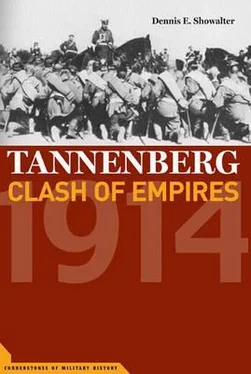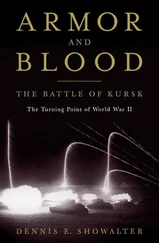The major challenge to both the diplomatic and the military aspects of German policy came from Russia. The tsar’s empire was in a position simultaneously to threaten the existence of Austria-Hungary and the balance of Europe, either by direct initiative in the Balkans or indirectly by supporting the increasingly powerful Slavic states of the peninsula. Bethmann’s overtures to Britain, while they certainly had the positive aim of enhancing Germany’s position, incorporated a negative element as well: the hope of restraining Russia, whether by British actions or through collective diplomacy. In the final analysis, however, Germany must ultimately depend on her own resources. Bethmann’s hopes for a reborn Concert of Europe were unlikely to bear fruit unless Germany should herself be capable of serving as its fulcrum. And in the context of the early Twentieth century, this meant developing and demonstrating the kind of military capacity that would make the risks of challenge too high to be undertaken except as a last, desperate resort.
Unfortunately for Bethmann’s vision, most of the desperation seemed to be felt by Germany’s soldiers. Schlieffen, in retirement the éminence grise of the general staff, had grown increasingly obsessed with the concept of a decisive battle in Belgium and northern France. His proposed modifications of the plan of 1905 developed corresponding tunnelvision, with schedules ever more rigid, with margins for error and friction reduced to the vanishing point. As chief of staff he had never felt able to ignore the Russian threat. As a theorist without responsibility, he was by 1913 advocating that the eastern theater be stripped of all save token garrison forces drawn primarily from the lowest categories of reservists. For support he turned no longer to the classical past, but to the campaigns of Frederick the Great. Frederick, he argued, could have crushed Austria in 1757 had he only possessed the moral courage to concentrate the Prussian army in Bohemia, instead of leaving detachments in Pomerania, East Prussia, and the Rhine provinces. 70
Moltke the Younger was at once less sanguine and less abstract. In December, 1911, he observed that Germany’s chances in a war against Britain and France were good—if Russia remained neutral. Britain’s army was small. France lacked the manpower reserves to sustain a large-scale war. Russia, on the other hand, could use her vast spaces to prolong conflict indefinitely. Improved mobilization, new strategic railroads, and a revitalized officer corps combined to enhance Russia’s military potential. The countryside was still not pacified. Non-Russian peoples smarted under Great Russian chauvinism. But Russia was well able to resume its expansionist policies at least in the Middle and Far East. 71
In view of the actual course of events in the east between 1914 and 1917, a question of increasing interest is why Russia’s power was so overrated in the years before 1914. Paul Kennedy suggests that Europe in general and Germany in particular were mesmerized by numbers in uniform. He goes on to demonstrate that despite the often-cited increases in Russia’s armed forces, her productive capacity was actually decreasing relative to Germany’s in the years before 1914. The military giant was an economic dwarf. Programs of military reform initiated after 1905 were frustrated by bureaucratic infighting and institutional inertia. The tsarist army’s inefficiency, other critics argue, was the systemic product of centuries, not to be overcome by technical innovations, new drill regulations, or shuffling of officers’ appointments. Russian generals themselves, when not speaking for public consumption, constantly questioned their army’s readiness for war. 72
In this context German concern for the Russian threat suggests incompetence on one hand, insincerity on the other. Was the general staff conjuring up a bogey to increase military budgets and enhance the acceptability of a future war? On a larger scale, did the new emphasis on Russia reflect a fundamental shift in German foreign policy from Weltpolitik to Ostimperium, either as an end in itself or an interim solution to domestic problems of encirclement and destabilization? Part of the answer lies in Germany’s position in the first decade of the new century. Her population was expanding at a rate frightening to her continental neighbors. She had matched and surpassed Great Britain in a broad spectrum of industrial and business activities. Her socialist movement was a model for the world’s organized labor. Her political system, with its synthesis of centralism and federalism, monarchy and populism, was an adventure widely respected beyond German borders. Culturally, intellectually, even sexually, Germany was a society open to experimentation, a society seeking new forms. Her Einkreisung was as much spiritual as political, a reaction to a world order imposed by French civilisation and the Pax Britannica. Yet this dynamism was balanced by a consciousness of weakness, of vulnerable geographic and military positions, of ideas subject to challenge by their very newness. The processes of change and growth at the heart of Germany’s strength seemed at the same time a source of weakness, eroding society’s all-too-fragile vital center. 73
Germany was also developing a sense of her objective limitations. For all its emphasis on vitalism and the categorical imperative, the Second Reich was essentially a material empire whose superiority to her neighbors rested on an ability to mobilize domestic human and economic resources in a developed industrial system. An ethnically homogeneous Germany stood against a polyglot Austria-Hungary. Sixty million Germans outweighed forty million Frenchmen, as did an empire with a balanced national economy compared to a Britain depending for her existence, much less her prosperity, on a complex structure of imports. Yet even this powerful position was relative. Compared to the vast potential of the United States on one hand and Russia on the other, Germany was a dot on the map—a situation indicated, if not quite demonstrated, by her recent adventures in Weltpolitik.
As yet the New World could be discounted. Russia, however, was altogether another matter. While the United States was an uncertain participant in the game of power politics, Russia had a permanent seat at the table. Russian raw materials and Russian markets lured a Germany perceiving the limits of simple colonialism. But in the new century Russia’s image was changing sharply. Tolstoy, Dostoyevsky, Chekhov, brought new life to a Western culture that seemed increasingly mannered, increasingly sterile. Russian music filled concert halls. Russian ballet drew superlatives from the most jaded critics. Russia was “discovered” as a land of simple peasant virtues by neo-Romantic intellectuals, and as a vital frontier by travellers eager to ride the newly completed Trans-Siberian Railway.
This process inspired respect and generated anxiety. The degenerated barbarians of de moribus ruthenorum posed less of a threat by far than a Kulturvolk with a million-man army and an economic system that bade fair in the coming decades finally to take advantage of a seemingly inexhaustible base of natural resources.
Attitudes towards Russia were also influenced by the actions of two specific pressure groups. The Baltic German community increasingly described itself as victims of Russification and revolution. Particularly in the aftermath of events in 1905–06, its image of Russia was of a colossus in its death throes, whose convulsions bade fair to bring down the rest of Europe as well. From a different perspective, an increasing number of Russian students and political exiles described a tyrannical autocracy determined to crush whatever sparks of freedom and dignity remained to its people in the aftermath of the Black Hundreds.
Читать дальше












